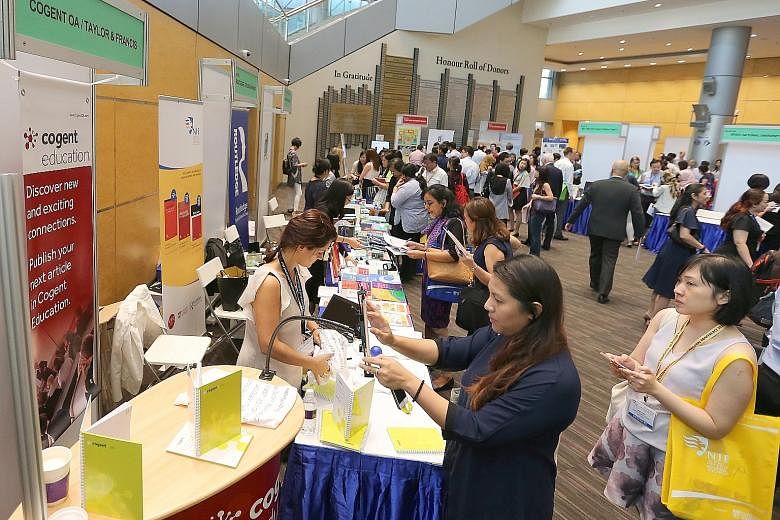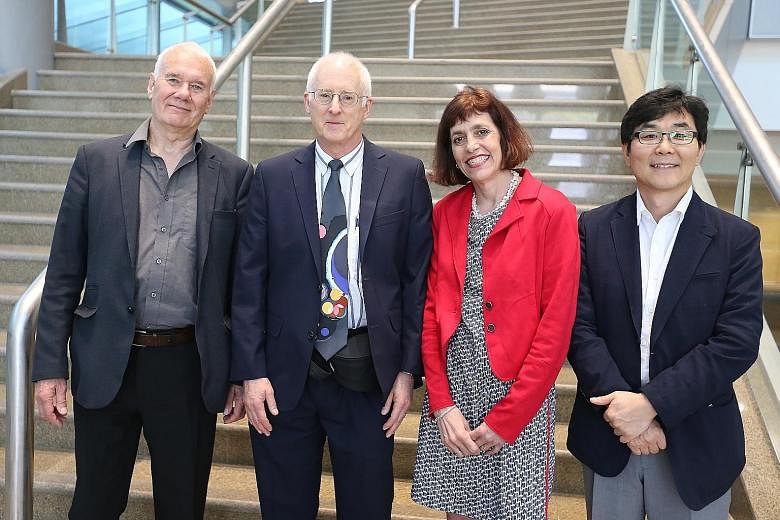Making significant, deep-rooted changes to education to cope with disruption may be the reality, but these require time and buy-in not just from teachers but also parents and students.
"There're so many stakeholders: Teachers need to really understand what the reforms are, parents may be anxious because they may be different from what they were used to and worry whether their child will be prepared, and students may be uncomfortable as they're being introduced to something new," said Professor Clare Kosnik, who specialises in teacher education at the Ontario Institute for Study in Education at the University of Toronto.
She was speaking during a roundtable discussion about Singapore's education system at last week's Redesigning Pedagogy International Conference organised by the National Institute of Education, alongside three other keynote speakers, all international experts in education.
In its seventh edition, the conference held at the Nanyang Technological University saw some 1,400 international participants from the education sector sharing and exchanging creative teaching pedagogy over three days of presentations, panels and workshops.
The past two years have seen several significant shifts to the Singapore education system. The longstanding Primary School Leaving Examination T-scores will be replaced by larger scoring bands, and polytechnics and universities have been admitting more students based on their talents and interests.
Professor Kim Sung Il, an expert in interest-based learning at Korea University, lauds the shift away from academic grades to aptitude-based admissions. "(We need to look at) more than just grades, but (also) motivation, persistence and enthusiasm," said Prof Kim. "Looking at students holistically, rather than just their skills, grades or qualifications, is a more desirable way to assess them."
But there are some hurdles to overcome getting there, said Professor Robert Root-Bernstein, a scientist, humanist and artist at Michigan State University. "We have to show the stakeholders that there is a problem or challenge that the current system does not address," he said. "Teachers and parents have to be actively engaged and want to be involved to produce that education for the students."
Prof Kosnik added that the role of teachers is incredibly complex and they have to experience the new pedagogy for themselves and understand why it is important, only then can they better engage their students. "If they don't know how it looks like in practice, then it would be very hard to adopt," she said. "I think we have too much jargon… and there's the depth of understanding that has to go beyond just the terminology."
Moving away from formal education, "lifelong learning" has become the latest buzzword here, with Singaporeans encouraged to pick up new skills as part of the nationwide SkillsFuture initiative. A result of the Fourth Industrial Revolution, the initiative was introduced to equip Singaporeans with relevant skills to help them adapt to new jobs.
Prof Root-Bernstein said that to get more on board, there is a need to instil a sense of curiosity in people. "You have to want to continually relearn things, learn new things, and keep up with things, because that's what motivates you to want to improve yourself," he said.
He added that many in the United States also come out of university thinking that it's the end of their education, but a degree is just "a start for everything they will do for the rest of their lives".
Still, Professor David Carr, a philosopher and emeritus professor at the University of Edinburgh, cautions that education has to remain focused on personal formation rather than putting too much emphasis on regarding people as "just cogs in an economic machine".
"We've departed from a traditional concept of education as a source of insight, to a concept of education as very instrumental in the promotion of useful skills, skills that will help people get on in life and promote the economy," he said. Instead of treating education as a tool to just train people to compete in the increasingly competitive globalised economy, it should be seen as a virtue unto itself.
Prof Kosnik said education is not a choice between skills and content or intellectual curiosity, but a combination of both. "I think our discussion of education is still too polarised and I don't think that helps us. We need some of everything," she said.


